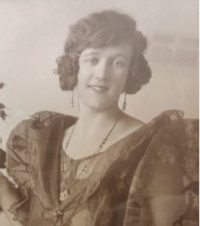I did not sleep well last night in spite of the Luminal, and I felt somewhat drowsy this morning, but no chance to sleep. Since before daylight the Japanese planes have been flying over us on the way to their bases. About 3:30 a.m. we heard a heavy drone, and we knew they must be American planes. In the early morning light, we could see three formations flying very high towards Iloilo. At that moment we heard the Japanese ring their bell to take cover. We all went downstairs to the shelter, but we watched from a window. The planes circled and headed north. According to eyewitnesses a Japanese plane was flying very low. Our planes saw it and dove toward it. We could hear them open fire. When all was quiet we went out and looked and saw columns of black smoke. We did not know at the time that it was a plane, but thought it was a gasoline depot. The planes also bombed other places as we could hear the concussion.
Later on during the day while we were eating lunch, we heard the sound of a plane. We all looked out, and there was a beautiful four-motor resembling a huge, silver bird. As we looked, there was a big puff of smoke coming out of its engine. Dorothy and I were a little frightened for fear it had engine trouble. But Meñing said, “That’s not smoke, but leaflets!” Sure enough, we could see little white pieces of paper floating gently downwards. How thrilled we were to know that the message on those pamphlets were for us!
The rest of the day was quiet, but we never found out the message on the leaflets as none fell near us.
As I mentioned before, the Japanese have left the garrisons (including the one across from us) and are now living in private homes which the civilians had vacated. We have some living near us and they have a lookout posted on the roof. Every sound he hears, whether it be a plane or a car, he calls out identifying it. If he sees a plane, he rings a bell to warn the Japanese to go to their fox holes, then he leaves the roof for his fox hole. No soldier is allowed to shoot at a plane under penalty of death. Japanese soldiers shooting at planes was the cause of so many civilian deaths in Cebu.
